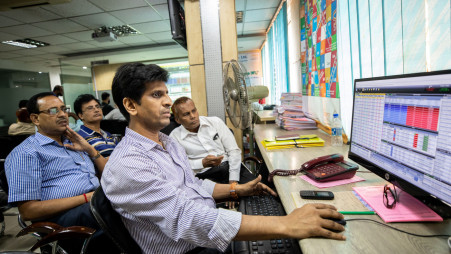Index stable, investors inactive after imposing floor price

Following the imposition of floor price in the capital market, stock indices have remained almost stable, but the participation of investors – already suffering due to a liquidity crisis – has decreased and turnover has dropped significantly
Capital market investors have been struggling to sell their shares as buyers are not interested in acquiring shares stuck at the floor price, causing a bearish trend.
Since the floor price was introduced on 28 July last year, the DSEX remained above 6,000 points for 147 consecutive working days.
On 31 July 2022, the first working day after imposing the floor price, the DSEX was at 6,133 points and the daily turnover was Tk576.95 crore.
After almost seven months, the DSEX stood at 6,199 points on Monday, while the turnover was Tk261.73 crore.
On Monday, the DSEX increased by 17 points and turnover by 13% compared to the previous day.
Following the imposition of floor price, the DSE witnessed the highest turnover – Tk2,832 crore – on 20 September 2022, and the lowest – Tk146 crores – on 22 August that year.
During that period, the DSEX was the highest – 6,600 points – on 19 September 2022, and the lowest – 6,133 points – on 31 July 2022.
Recently, transactions at the capital market have become concentrated in a small number of companies. As the investors' participation has not been increasing and transactions not gaining momentum, the stock indices have been dropping within a couple of days of increasing, keeping them stable.
The stock market regulator has been urging the market intermediaries – big investors in the capital market – to increase their participation, but there is practically no result.
The Bangladesh Merchant Bankers Association (BMBA) is going to hold a meeting again with the Bangladesh Securities and Exchange Commission (BSEC) to discuss possible solutions to the ongoing crisis.
According to sources at the BMBA, the meeting might be held on Tuesday. Along with the bankers and BSEC officials, market intermediaries may also participate in the meeting.
On 21 December last year, the securities regulator relaxed the fixed floor price rule for 168 companies, and allowed up to a maximum of 1% reduction in their share prices.
On condition of anonymity, a top official of a brokerage house told TBS, "Imposing floor price was a big mistake by the commission. It has temporarily stopped the market decline, but it will create a big crisis in the long run.
He said currently most of the shares are stuck at the floor price. Those who have invested with margin loans, their share value has decreased a lot. In many cases forced sale would be required to recover the loans. As a result, investors will face losses in the long run.
Merchant Bankers Association President Sayedur Rahman told TBS, "Policy support is needed to overcome the current situation. Decisions have to be taken on the steps that will increase the supply of money in the market.
"There are sellers in the market, but there are no buyers. Shares get stuck at a particular price. This requires measures to increase the supply of money. The market should be allowed to move at normal pace. The authorities should not impose any barriers. They should allow the situation to decide everything."
Margin loan takers face crisis
According to a number of brokerage houses, traders who invested with margin loans have been going through a crisis as they were not able to sell the shares and repay the interest and principal of the loan.
Currently, the investors can take margin loans at 1:1 rate in the capital market, which means if someone has an investment of Tk100, he can take another Tk100 loan at 12-15% interest for investing in stocks.
Many margin loan takers cannot sell their stocks to repay their debts as buyers are not interested in acquiring shares stuck at the floor price.
BMBA President Sayedur Rahman said, "The market is now very inactive, because many people's investments have stuck. They do not want to invest again. Others are on the sidelines due to the shares stuck at floor price.
"To remedy the situation, the supply of money in the market must be increased, otherwise the speed of transactions cannot be increased."
"We always recommend selling shares and not taking margin loans. Still, investors borrow. Merchant banks also borrow from other banks and lend to investors," he added.
Sayedur Rahman said currently both the lenders as well as the borrowers are in a crisis as investors do not want to pay interest. These lenders get the interest and principal only after selling the shares.
Stock market on Monday
According to EBL Securities daily market commentary, the equity indices of the Dhaka bourse broke their prolonged losing streak as opportunist investors sought bargain hunting in some beaten down issues, taking advantage of the recent correction in the market.
The market remained upbeat throughout the session, riding on investors' buying binge on sector-specific scrips which they deemed as lucrative at the prevailing market prices.
However, cautious investors are being watchful and have remained on the sidelines amid shaky confidence and squeezed liquidation opportunities across the trading floor.
Meanwhile, the Dhaka bourse observed some increase in participation as total turnover rose by 13.1% to Tk261 crore, and DSEX increased by 17 points to settle at 6,199 points as against 6,182 points in the previous trading session.
Out of the total 310 stocks, 56 advanced, 98% declined and 156 stocks remained unchanged.
According to Royal Capital on Monday, 175 stocks are traded at floor price, and four stocks Advent Pharma, BD Lamps, Eastern Cables, and National Tea Company exited from the floor price.



 Keep updated, follow The Business Standard's Google news channel
Keep updated, follow The Business Standard's Google news channel
















